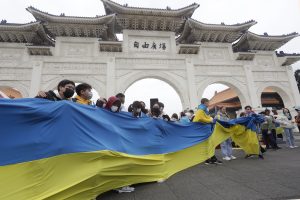The timing and setting of an event in Taipei to mark the first anniversary of Russia’s invasion of Ukraine couldn’t have been more appropriate. Organized by Taiwan Stands With Ukraine (TSWU), a civil society movement that sprang up in the wake of the invasion, the event coincided with a four-day national holiday in Taiwan commemorating the February 28 Incident – known locally as 228.
This 1947 uprising against – and subsequent crackdown by – the Kuomintang (KMT) government, which claimed thousands of lives, marked the beginning of the White Terror period and four decades of martial law. As such, it has become a focal point in Taiwanese consciousness.
Until 2007, the name of Chiang Kai-shek, the man responsible for these abuses, was emblazoned on the panel at the central archway where the crowd assembled for the event in support of Ukraine. These days, the sign reads “Liberty Square,” in reference to large plaza it opens onto. From the 1980s onwards, the square became a locus for dissent, with the Wild Lily student movement of 1990 being the most prominent protest. But, despite the square’s current association with democratization, the grounds in their entirety and the nearby metro station remain dedicated to Chiang. From a pavilion atop a platform at the southern end of the square, a huge bronze effigy of the late dictator still presides over a space that now represents values he opposed.
Further highlighting this complicated aspect of Taiwanese history, Taipei Mayor Chiang Wan-an, who claims to be Chiang Kai-shek’s great-grandson, spoke at a commemoration at the nearby 228 Peace Memorial Park the following day. He issued an apology of sorts for White Terror excess, which he called “historical pain,” but for some his presence at such a location on the anniversary was too much.
“It’s a provocation,” said a journalist with the local Liberty Times newspaper who was in the square on his day off to show solidarity with Ukraine. “And, let’s face it, he probably won’t even really say sorry,” he added, correctly anticipating one of the main critiques of Chiang Wang-an’s address.
For those assembled in front of the arch, the significance of such juxtaposed symbols of freedom and repression was not lost. Parallels between Taiwan and Ukraine can be overplayed, but the bond felt by attendees of both nationalities in the face of authoritarian aggression is undeniable.
“It’s great to have this event at such a meaningful place as Liberty Square,” said TSWU organizer Alex Khomenko. “The news cycle moves on, and people naturally forget, so to have politicians and others here speaking so strongly in favor of Ukraine, one year on, means a lot.”
While all attendees were passionate in their support for Ukraine, three men stood out in their commitment to the cause. Dressed in army fatigues, they stood to one side of the stage, largely content to let the others do the talking. They were a slightly odd bunch – different shapes and sizes, contrasting characters and motivations – but united by their decision to serve in the defense of Ukraine.

































